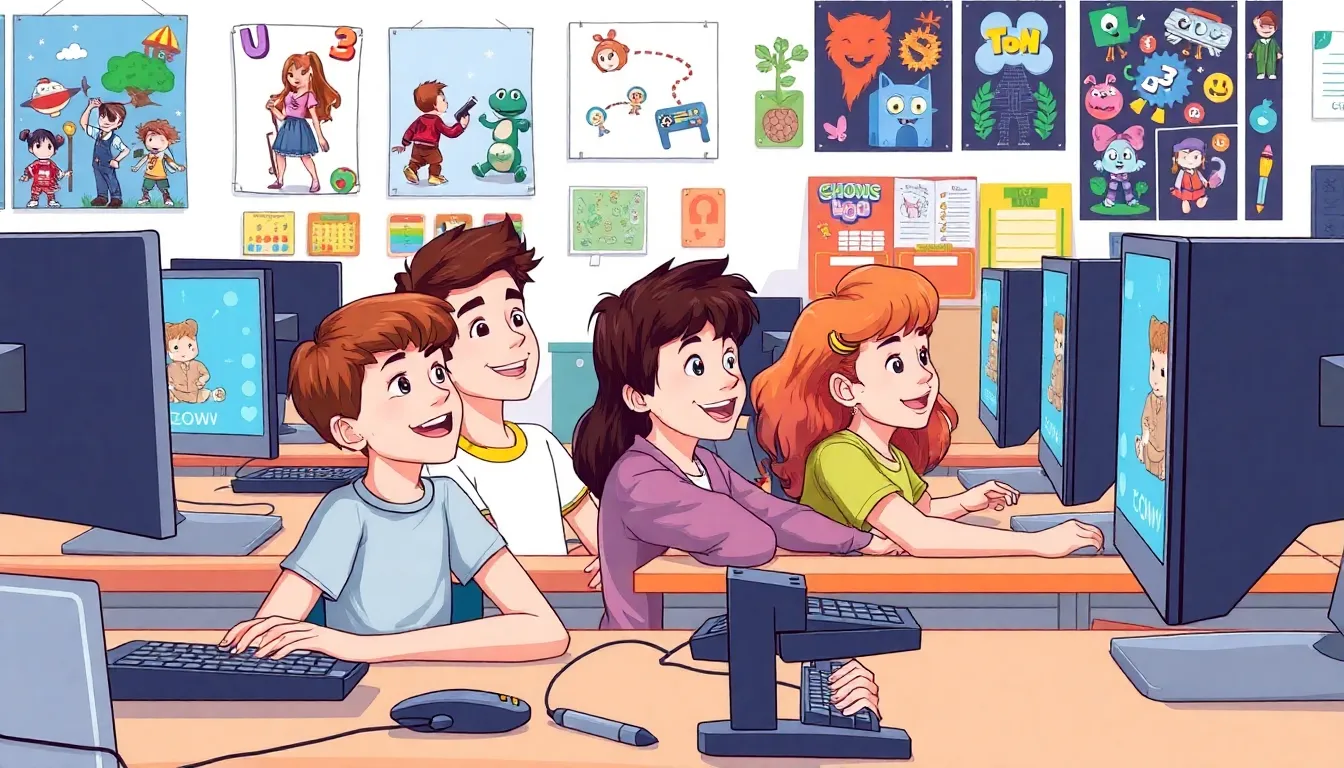The Best Fluffy Pancakes recipe you will fall in love with. Full of tips and tricks to help you make the best pancakes.

Kids PC Games: Top Picks for Fun and Learning That Parents Will Love
In a world where kids are glued to screens, finding the right PC games can feel like searching for a needle in a haystack. But fear not! The realm of kids’ PC games is bursting with colorful adventures and brain-boosting challenges that can turn screen time into a fun learning experience. From racing through fantastical worlds to solving puzzles that would stump even the smartest of adults, these games offer more than just entertainment—they spark creativity and critical thinking.
Kids PC Games
Kids PC games offer numerous advantages, blending fun with educational value. These games enhance learning while keeping children engaged.
Cognitive Development
Cognitive skills grow through engaging puzzles, strategy-based challenges, and creative storytelling. Kids learn problem-solving techniques that sharpen critical thinking. Games often require planning and foresight, allowing children to develop their reasoning abilities. Research indicates that children exposed to such interactive settings tend to excel in tasks requiring analytical thinking. Games like “Portal 2” and “Minecraft” encourage resource management, boosting cognitive flexibility. This immersive experience fosters not only knowledge retention but also stimulates creativity as children explore different solutions.
Social Skills Enhancement
Playing PC games can significantly enhance social interaction among children. Multiplayer platforms encourage teamwork and collaboration, allowing kids to communicate effectively with peers. Through shared experiences, friendships often form, reinforcing social bonds. Many games feature chat functions, promoting conversational skills and cooperation. Additionally, conflicts in games teach conflict resolution strategies, making social interactions smoother in real-life scenarios. Games like “Roblox” and “Among Us” provide opportunities for socialization, enabling children to learn about empathy and understanding different perspectives.
Popular Kids PC Games

Numerous engaging PC games capture children’s attention while promoting learning and creativity. These games encompass various genres, allowing kids to explore educational content, adventure tales, and fantasy realms.
Educational Games
Educational games foster learning through interactive experiences. Titles such as “Osmo: Genius Starter Kit” encourage problem-solving skills and hands-on activities. “Zoombinis” teaches logic and critical thinking as children navigate challenges. Another standout, “Kahoot!” combines quiz-based learning with competitive play, making studying fun. These games not only support academic concepts but also enhance cognitive skills, enabling kids to grasp essential knowledge while enjoying themselves.
Adventure and Fantasy Games
Adventure and fantasy games spark imagination and exploration. “Minecraft” allows players to build and create in a limitless world, encouraging creativity and resource management. In “LEGO Worlds,” kids can construct their own characters and environments, promoting originality. “Roblox” provides a platform for users to create and play unique games, enhancing social engagement. These titles immerse children in captivating stories while developing problem-solving abilities and teamwork through collaborative gameplay.
How To Choose The Right Kids PC Game
Selecting the appropriate PC game for children involves careful consideration of various factors. Prioritizing age, content, and educational value ensures a positive gaming experience.
Age Appropriateness
Consider the child’s age when selecting a game. Games frequently designate age ratings to inform parents on suitable content. Titles rated E for Everyone are perfect for young players, while games with an E10+ rating may suit older children. Check additional descriptors provided in the rating, as they often detail themes or content types. Games must align with the child’s maturity level, enhancing enjoyment and engagement. Age-appropriate selections lead to better learning outcomes and foster social interactions among peers.
Content Considerations
Evaluate game content to ensure it’s suitable and educational. Focus on games that promote creativity, collaboration, and problem-solving skills. Look for themes that encourage exploration or teamwork. Educational games can enhance learning experiences by integrating subjects like math, science, and language arts seamlessly. Detailed game descriptions often highlight these aspects, allowing precise evaluations. Review parental controls and safety features to maintain a secure gaming environment. Thoughtful consideration ensures games provide value while entertaining the child.
Safety Tips For Kids Playing PC Games
Ensuring a safe gaming environment is crucial for children. Parents can set guidelines to help kids play responsibly.
Screen Time Limitations
Establishing screen time restrictions benefits children’s health. Experts recommend a maximum of one hour of recreational screen time per day for kids aged six and older. Regular breaks during gaming sessions help prevent fatigue and promote physical activity. Encouraging outdoor play or other hobbies balances screen time with physical activity. Monitoring gaming habits allows parents to engage in discussions about game content and social interactions.
Online Safety Practices
Encouraging safe online practices protects children while gaming. Use parental controls to restrict access to inappropriate content and manage interactions with strangers. Discussing the importance of keeping personal information private helps kids understand potential risks. Remind children to report any suspicious behavior or uncomfortable situations encountered during gaming. Educating them about recognizing online scams or harmful interactions fosters safe gaming experiences.
Conclusion
Finding the right PC games for kids is essential in today’s digital landscape. Engaging games not only entertain but also enhance cognitive skills and foster social interactions. By choosing age-appropriate titles that emphasize creativity and problem-solving, parents can ensure a positive gaming experience.
Implementing safety measures and setting screen time limits further promotes responsible gaming habits. This balanced approach helps children enjoy the benefits of gaming while developing essential life skills. With the right guidance and game selection, kids can explore exciting worlds that inspire learning and collaboration.
